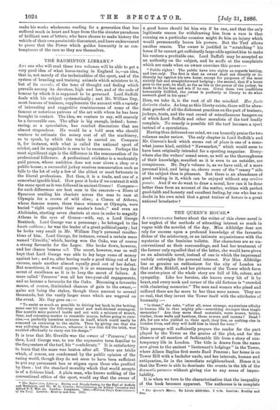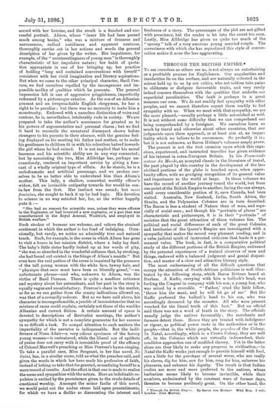THE QUEEN'S HOUSE.*
A COMMENDABLE feature about the writer of this clever novel is
her neglect of the methods of attracting interest so much in vogue with the novelist of the day. Miss Alldridge does not rely for success upon a profound knowledge of the favourite dishes of the aristocracy, or an intimate acquaintance with the mysteries of the feminine toilette. Her characters are as un- conventional as their surroundings, and had her treatment of the former only equalled that of the latter, she would have given us an admirable novel, instead of one in which the impersonal unduly outweighs the personal interest. For Miss Alldridge has as genuine an enthusiasm for the city of London as that of Mrs. Riddell, and her pictures of the Tower which form the centre-piece of the whole story are full of life, colour, and sympathy. Like her heroine, she knows every bit of it by heart, and every nook and corner of the old fortress is "crowded with clustering memories." The men and women who pined and suffered there are far more to her than mere names. They are so real, that they invest the Tower itself with the attributes of humanity :—
"Is there," she asks, "after all, some strange, mysterious affinity to human life in that mighty pile—something stranger than tragic memories ? Are they mere dead materials, mere stones, bricks, timber, those walls and bastions, those towers and turrets ? Dead ? Ah, for one who yielded to their spell, they live, as nothing else in London lives, and they will hold him in thrall for ever."
This passage will sufficiently prepare the reader for the part played by the Tower as the genius of the plot, and for the absence of all mention of fashionable life from a story of con- temporary life in London. The title is drawn from the name now given to the ancient "lieutenant's lodgings" in the Tower, where Alison Bayliss first meets Basil Penrose ; her home is on Tower Hill with a bachelor uncle, and her interests, human and antiquarian, lie in the immediate neighbourhood. Hence it is that the Tower is able to dominate the events in the life of the dramatis personce without giving rise to any sense of impro- bability.
It is when we turn to the characterisation that the inequality of the book becomes apparent. The authoress is in complete
• The Queen's Rouse. By Lizzie Alldridge. 3 vtla. London: Bantley and Boa.
accord with her heroine, and the result, is a finished and suc- cessful portrait. Alison, whose "inner life had been passed much among books," who was a mixture of firmness and nervousness, radical untidiness and apparent neatness, thoroughly carries out in her actions and words the general description of her given by the writer. Her impatience, for example, of the " uninterestingness of young men" is thoroughly characteristic of her impulsive nature; her habit of quota- tion appropriate in one of her bringing up, her practice of holding " long and sustained conversations with herself" consistent with her vivid imagination and literary aspirations. But when we come to the other principal character, Basil Pen- rose, we find ourselves repelled by the incongruous and im- possible medley of qualities which he presents. The general impression left is one of aggressive priggishness, imperfectly redeemed by a picturesque exterior. As the son of an Albanian peasant and an irreproachable English clergyman, he has a right to be peculiar ; but there was no necessity to make him a monstrosity. Endowed with a nameless distinction of voice and contour, he is, nevertheless, intolerably rude in society. We are prepared to take the author's assurances for granted as to
his powers of argumentation and personal charm ; but we find it hard to reconcile the unnatural disrespect shown before strangers to his parents in their absence, with the genuine feel- ing displayed on his meeting his father and mother, or to make his gentleness to children fit in with his relentless hatred towards the girl whom he had ruined. It is not implied that his moral baseness and his scientific ability are in any way connected; but by associating the two, Miss Alldridge has, perhaps un- consciously, rendered an important service by giving a fore- cast of a wholly original type of villain. As he stands, he is a melodramatic and artificial personage, and we profess our- selves to be no better able to understand him than Alison's mother. This lady, a shallow, somewhat worldly officer's widow, felt an invincible antipathy towards her would-be son- in-law from the first. Her instinct was sound; but more feminino, she sought to back it up by bad logic. His devotion to science in no way satisfied her, for, as the writer happily puts it :— "She had no respect for scientific men, unless they were officers in the Engineere, or had invented a new explosive, or a gun that was manufactured in the Royal Arsenal, Woolwich, and employed in British warfare."
Such strokes of humour are welcome, and relieve the strained sentiment in which the author is too fond of indulging. Occa- sionally, but rarely, we notice an admirably true and natural touch. Such, for example, is the scene in which Alison has gone to visit a house in her mission district, where a baby lay dead. The baby's little sister hardly looked up at her words of pity, "she was so absorbed in the wonderful softness that, by stroking, she had found out existed in the fringe of Alison's mantle." But even here the real pathos of the scene is impaired by the presence of the tall young woman with the white face, tawny hair, and "physique that once must have been so liberally grand,"—an unfortunate phrase—and who, unknown to Alison, was the victim of Basil Penrose. There is quite a needless reticence and mystery about her antecedents, and her part in the story is equally vague and unsatisfactory. Penrose's share in the matter, so far as we can gather from the scanty indications allowed us, was that of a cowardly seducer. But as we have said above, his character is incomprehensible, a jumble of inconsistencies that no mixture of races could explain, certainly not those of the warlike Albanian and correct Briton. A certain amount of space is devoted to descriptions of Revivalist meetings, the author's sympathy for which is not a complete guarantee for her success
in so difficult a task. To compel attention to such matters the impartiality of the narrator is indispensable. But the indif- ference of Nona Adair—a very odious specimen of the horsey young woman—is caricatured, while the liberal use of epithets of praise does not carry with it irresistible proof of the efficacy of Colonel Maxwell's preaching or Miss Penrose's hymn-singing. To take a parallel case, Miss Sergeant, in her fine novel, No Saint, has, in a similar scene, told us what-the preacher said, and given the words in which her hero made his profession of faith, instead of letting us take that for granted, or confining herself to a mere record of results. And the effect is that one is made to realise
the scene and sympathise with the actors. Here an indefinable re- pulsion is excited by the prominence given to the crude details of emotional worship. Amongst the minor faults of this novel, we would point out the undue stress laid upon presentiments, for which we have a dislike as discounting the interest and freshness of a story. The personages of the plot are not gifted with prescience, but the reader is let into the secret too soon. Lastly, Miss Alldridge has given us quite too much of the " spoony " talk of a very amorous young married couple. The correctness with which she has reproduced this style of conver- sation makes it none the less aggravating.



































 Previous page
Previous page